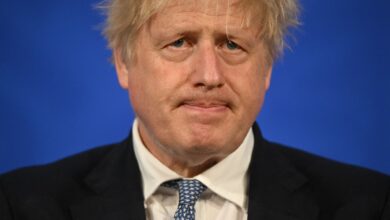Recession fears grow as UK economy shrinks 0.3% in April amid spiralling living costs

The UK headed closer to a recession as the economy shrank unexpectedly in April amid spiralling prices for essential goods that have stretched household budgets.
Official figures showed gross domestic product – a measure of the total goods and services produces – fell 0.3 per cent in April, following a 0.1 per cent contraction in March and zero growth in February.
April saw domestic energy bills jump by 54 per cent at the same time as workers were hit with a National Insurance hike. Meanwhile, food and fuel prices have surged following major disruuption to supplies in the wake of Russia’s invasion of Ukraine.
The Office for National Statistics said on Monday UK’s Gross domestic product (GDP) is now 0.9 per cent above the pre-pandemic level after it fell by 0.3 per cent in April, announcing the latest monthly data estimates from April on Monday.
Experts had been expecting a 0. per cent rise in GDP in April.
The ONS said it marked the first time GDP has fallen for two months in a row since March and April 2020, when the pandemic first hit and sent the economy tumbling.
Output contracted by 0.3 per cent in the services sector, which makes up more than three-quarters of the UK economy. This was largely due to the ending of the Government’s Covid-19 test-and-trace programme and lower vaccination activity.
Ending free testing shaved 0.5 percentage points off GDP. With the test and trace and vaccines impact stripped out, output would have risen by 0.1 per cent in April, the ONS said.
Activity also fell in the two other major parts of the economy. Manufacturing shrank 1 per cent as firms reported being hit hard by big price rises and delays to supplies. Construction output fell 0.4 per cent.
Analysts were divided on the question of whether the UK will avoid a recession, which is defined as two quarters of negative economic growth.
Martin Beck, chief economic advisor to the EY Item Club said the outlook was poor.
“An already serious squeeze on households’ spending power will be negatively affected by the inflationary impact of global supply chain frictions and sterling’s recent weakness.
“And UK interest rates are likely to rise again later this week,” he said.
The Bank of England is set to announce its latest interest rate decision on Thursday, with markets expecting a further rise.
The Bank’s Monetary Policy Committee (MPC) is seeking to tame inflation which is forecast to hit 10 per cent later this year, well above the 2 per cent target rate.
Further increases will further eat into household budgets and are expected to slow consumer spending which will drag on the wider economy.
Samuel Tombs, chief UK economist at Pantheon Macroeconomics, said private sector activity had helped to offset a sharp fall in Covid-related government spending and “renewed weakness” in manufacturing.
“Nonetheless, a recession-two quarters of negative growth-remains unlikely,” he said.
“Households’ real disposable incomes should rise in both the third and fourth quarters now that the Chancellor has announced an extra £5bn in grants during these quarters, equal to nearly 2% of their likely income in these quarters.





